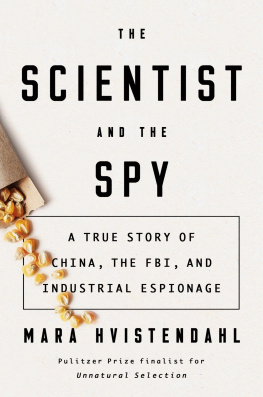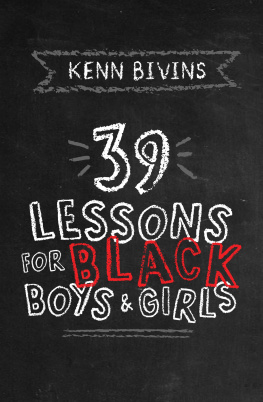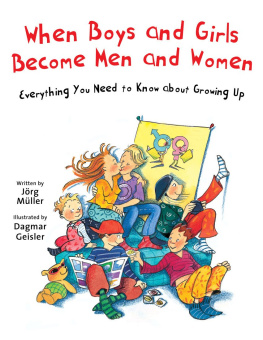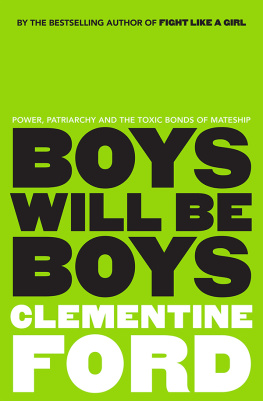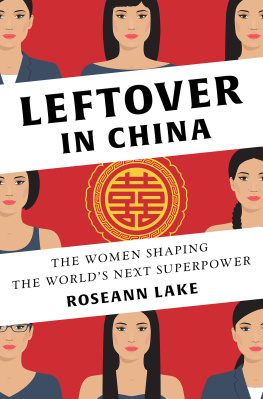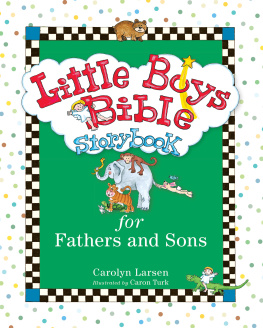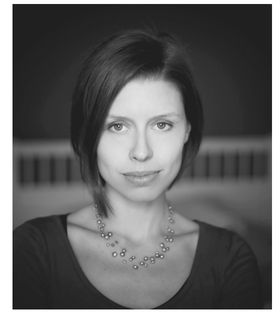ACKNOWLEDGMENTS
In the beginning this was a zygote of an idea, a small plan for a magazine article on the effects of Chinas sex ratio imbalance. Ted Genoways at the Virginia Quarterly Review believed in that idea and provided me the space in which to explore it. He was also invaluable in encouraging me to look beyond sex trafficking and bride buying toward the other, less obvious ways in which sex selection can transform a society. His curatorial voice stayed with me as the article grew into a book.
Ariana Lindquist collaborated with me on that early assignment and turned out to be the best photographer I could have hoped for. Ariana introduced me to the Suining families whose experiences formed the backbone of my reporting, and her deeply humanistic photos pushed my writing to new levels. After we completed the article she continued to volunteer relevant details and read over drafts of chapters. I know few who are as dedicated to their work.
I am indebted to the editors who let me take time away from my regular correspondent gigs to write this book, particularly Beth McMurtrie at The Chronicle of Higher Education and Richard Stone at Science. Others commissioned and shaped articles that found their way into the preceding pages: Britt Peterson, then at The New Republic, and Ben Austen, then at Harpers. And I am obliged to those editors whose assignments sustained me, both economically and intellectually, over the past three years: Paul Adams, George Black, David Malakoff, Mike May, Michael Moyer, John Parman, Samir Patel, Jennifer Ruark, Greg Veis, and Jacob Ward.
This would perhaps be a very different work without the enthusiasm of Gillian MacKenzie, my agent, who loved the idea of a global book from the start and gave astute input in the proposal phase. She has been an excellent shepherd for the project.
Gillian also found the book a great home. The early and insightful guidance of Clive Priddle, my editor at PublicAffairs, nudged me in the right direction. Other editors who worked on the book but have since left the house include Morgen VanVorst and Lindsay Jones. Chrisona Schmidt copyedited, and Melissa Raymond, along with Sandra Beris of Perseus Books, saw the pages through to the printing stage. Katherine Schreiber diligently fact checked the manuscript and provided helpful suggestions along the way. All remaining errors are mine.
Various friends and family members read and commented on drafts. Thank you to Laura Danielson, Glenn Ford, Doris Klein, Jessica Pulver, and Renee Witlen for your insights and corrections. Rebecca Catching provided an extra set of eyes at the proofreading stage.
In my research on the population control movement I relied heavily on historian Matthew Connellys amazingly thoroughand very well-writtenaccount, Fatal Misconception. I appreciate his help in generously suggesting sources and sending relevant documents along the way. Also valuable were the librarians at Smith Colleges Sophia Smith Collectionparticularly Amy Hague, who expertly pointed me in the direction of relevant files in the Planned Parenthood Federation of America boxesand the guardian of the Center for Womens Development Studies archive in Delhi. (I wish I knew your name.) Finally, I drew on the deep website maintained by the Rockefeller Archive Center, along with the oral histories available on the Sophia Smith Collection and Truman Library websites.
Again and again I turned to demographers in the course of reporting this book. Some of them did not make it into the final draft. S. Irudaya Rajan graciously hosted me in Kerala, and Isabelle Attan spoke with me in Paris. Cai Yong was crucial in shaping my understanding of the one-child policy. Other scholars and activists who helped me grasp this topic include Mary E. John and Ratna Sudarshan in Delhi.
My reporting would have been a lot lonelierand the book that resulted less detailedwere it not for friends who housed and guided me in various cities around the world: Mr. and Mrs. Shiv Suri in Delhi, Nana Eun-A Seo in Seoul, Amanda Hong in Taipei, Tracey Suen in London, Zac Wyman in Paris, Dayna and Ember Frank and Angela Kim in Los Angeles, James Luke David in San Francisco, and Megan Shank and Adam Feeney in New York.
Friendsand sometimes friends of friendsintroduced me to sources and helped set up interviews: Jennifer Cheng, Yoonhee Cho, Gia Dinh, Karen Hyun, Christian Laudet, and Shravya K. Reddy. Ahead of my trip to South Korea I turned to Soyeon Gun, who translated my emails and made calls on my behalf. Arriving in Seoul, I relied on the expert translation of Ashley Sunya Yoon.
The writing process would have been a lot less fun without that motley club of book lovers from Sam Freedmans superb book seminar at Columbia School of Journalism: Gal Beckerman, David Biello, Shoshana Guy, Allan Jalon, and Kavitha Rajagopalan. Thanks to Sam for teaching me how to craft a proposal and for giving advice as I took a first stab at one. And thanks to Paul Hendrickson at the University of Pennsylvania for teaching me how to writeand observebefore that.
Two chapters of the book grew out of a late-night conversation with Adam Minter. A mentor and a close friend, Adam urged me not to shy away from difficult topicsand provided a fine example in his own reporting on China.
Also instrumental was the fiercely intelligent Laurel Kilgour. From suggesting bioethics readings to connecting me with potential sources to sending meticulous line-by-line edits on a draft, she was singularly helpful. I lucked out in the cousin department.
And I am grateful to the various friends and family members who related their experiences of pregnancy, abortion, IVF, and egg donation or let me sit in on intimate ultrasound exams and doctors appointments. You know who you are.
Others who contributed ideas or otherwise helped along the way include Parisa Yousef Dorst, Isaac Stone Fish, Ken Kostel, Hien Le, Renee Reynolds, Dawn Stover, and Jiyoung Yoon.
This is a book about family, and I would be remiss if I didnt mention my own. Jake Hvistendahl, my brother, and Barrs Lang, my near-brother, taught me about sex ratio imbalance before anyone else. (In our household generalizations about testosterone didnt always hold true, and it was often I who terrorized them.) In addition to being a loving guardian for a few important years of my life, Hongyu Lang gave me my first Chinese lessons. My father was the original reporter and has always encouraged me in my work. Yet another generation back, I owe a lot to the feisty Joan Danielson and to the minister-turned-novelist Dave Danielson, for showing me how to seize life and love writing (two often contradictory acts), and to English professor Marion Hvistendahl, for teaching me about both the rules and wonders of language early on.
Most of all I thank Aksel oruh, for providing balanceboth gender and the other sortin my own life, and for being the double in my happiness.
Mara Hvistendahl is a Beijing-based correspondent for Science. Her award-winning writing has also appeared in Harpers, Scientific American, Popular Science, the Financial Times, and Foreign Policy. Proficient in both Spanish and Chinese, she has spent half of the past decade in China, where she has reported on everything from archaeology to the space program. A former contributing editor at Seed magazine and journalism professor at Fudan University in Shanghai, Hvistendahl sits on the advisory board of Round Earth Media, an organization founded to promote international journalism. This is her first book.


